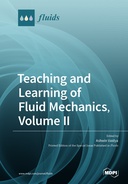Explore

Teaching and Learning of Fluid Mechanics, Volume II
0 Ungluers have
Faved this Work
Login to Fave
This book is devoted to the teaching and learning of fluid mechanics. Fluid mechanics occupies a privileged position in the sciences; it is taught in various science departments including physics, mathematics, mechanical, chemical and civil engineering and environmental sciences, each highlighting a different aspect or interpretation of the foundation and applications of fluids. While scholarship in fluid mechanics is vast, expanding into the areas of experimental, theoretical and computational fluid mechanics, there is little discussion among scientists about the different possible ways of teaching this subject. We think there is much to be learned, for teachers and students alike, from an interdisciplinary dialogue about fluids. This volume therefore highlights articles which have bearing on the pedagogical aspects of fluid mechanics at the undergraduate and graduate level.
This book is included in DOAB.
Why read this book? Have your say.
You must be logged in to comment.
Rights Information
Are you the author or publisher of this work? If so, you can claim it as yours by registering as an Unglue.it rights holder.Downloads
This work has been downloaded 128 times via unglue.it ebook links.
- 128 - pdf (CC BY) at Unglue.it.
Keywords
- active methodology
- applications of fluids
- Blasius
- boundary-layer
- CFD
- closure models
- computational fluid dynamics
- damped pendulums
- Data assimilation
- didactic transformation
- droplet impact
- Education
- existence
- Falkner–Skan
- fluid drag
- fluid dynamics education
- fluid mechanics
- fluid-structure interaction
- forward sensitivity
- Hiemenz
- Homann
- Hydraulic engineering
- hydraulic teaching
- inquiry-based instruction
- Julia
- Kalman filtering
- Laboratories
- learning and teaching
- Leray-Hopf weak solutions
- measurements fusion
- n/a
- Navier-Stokes equations
- open water tank
- outcomes competences
- practical engineering education
- primary level
- quasi-geostrophic equations
- reduced order models
- science education
- teaching-learning sequences
- Technology, engineering, agriculture
- Technology: general issues
- Undergraduate education
- variational and sequential methods
- vortex formation length
- vortex shedding
- wake
Links
DOI: 10.3390/books978-3-0365-1999-9Editions

